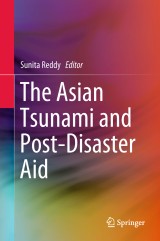Details

The Asian Tsunami and Post-Disaster Aid
|
96,29 € |
|
| Verlag: | Springer |
| Format: | |
| Veröffentl.: | 11.07.2018 |
| ISBN/EAN: | 9789811301827 |
| Sprache: | englisch |
Dieses eBook enthält ein Wasserzeichen.
Beschreibungen
<div>Through the lens of the Asian tsunami, this book problematizes concepts that are normally taken for granted in disaster discourse, including relief, recovery, reconstruction and rehabilitation. The unprecedented flow of humanitarian aid after the Asian tsunami, though well-intentioned, showed adverse effects and unintended consequences in the lives of people in the communities across nations. Aid led not only to widespread relief and recovery but also to an exacerbation of old forms of inequities and the creation of new ones arising from the prioritization, distribution and management of aid. This, in turn, led to the incongruity between the needs and expectations of the affected and the agendas of aid agencies and their various intermediaries. This book examines the long-term consequences of post-disaster aid by posing the following questions: What has the aid been expended on? Where has the aid primarily been expended, and how? And what were the unintended consequences of post-disaster aid for the communities? </div><div><br></div><div>This topical volume is of interest to social scientists, human rights and law researchers and environmental scientists interested in disaster studies.</div>
<div>Chapter 1. The Asian Tsunami and Post Disaster Aid: Critical Perspectives (Sunita Reddy).- Part 1: Aid, Conflict and Differential Distribution.- Chapter 2. An Ethno-Political Accounting of the Srilankan Tsunami: Impact and Recovery (Randhal Kuhn).- Chapter 3. Learning from Nature: Responding to Natural Disaster Need for a Multi–Faceted Approach in Law (V.T.Thamilmaran).- Chapter 4. Social Interfaces in Disaster Situations: Analysing Rehabilitation and Recovery Processes among the Fisher Folks of Tamil Nadu Post Tsunami in India (Sunil D. Santha).- Chapter 5. Disaster, Development, And Water: The Reconstruction And (Re)Fabrication Of Hazardous Waterscapes In Post-Tsunami India (Luke Juran).- Chapter 6. An Applied Anthropological Perspective on Localizing Post-Disaster Aid: Lessons from Post-tsunami Aceh, Indonesia (Patrick Daly).- Chapter 7. Land, Natural Resources and Sustainable Development in Aceh, Indonesia: Confronting Inequalities through Post-Tsunami and Post-Conflict Recovery (Jane Dunlop).- Part 2: Build Back Better? Relief Materials, Livelihoods, Shelters and Discontentment.- Chapter 8. The Sustainability of Humanitarian aid: The Nicobar Islands as a case of ‘complex disaster’ (Simron Jit Singh).- Chapter 9. The Tsunami and its Aftermath: Resilience and Rupture of the Social Fabric among the Nicobarese (Mohammed A. Abid).- Chapter 10. New Andamans: The Aftermath of Tsunami in the Andaman and Nicobar Islands (Sunita Reddy).- Chapter 11. Post-Disaster Housing: Lessons Learnt from the 2004 Tsunami of Sri Lanka (Nisha Arunatilake).- Part 3: Coping Strategies, Systems and Aid Effectiveness.- Chapter 12. Aid, Religion and Recovery in Post-Tsunami Thailand (Monica Lindberg Falk).- Chapter 13. Memory Interventions: Gujarat and Sri Lanka (Edward Simpson).- Chapter 14. Conflicting Paradigms and the Danger Discourse: Re-thinking Indian Disaster Management Framework in the Post-Tsunami Era (Pravin Kushwaha).- Chapter 15. Tsunami Recovery Impact Assessment and Monitoring System (TRIAMS): Methodological Approach Developed for Sri Lanka (Lakshman Dissanayake).- Chapter 16. Tsunami aid and its effectiveness (P.G.Dhar Chakrabarti).<br></div>
Sunita Reddy is Associate Professor at the Centre of Social Medicine and Community Health, School of Social Sciences, Jawaharlal Nehru University (JNU), Delhi. She is an anthropologist specialized in medical anthropology, and teaches public health in JNU. She has researched various issues related to health, violence against women and children, migrant women workers in construction and domestic sectors, medical tourism, surrogacy, and has published various research papers in national and international journals. She has delivered lectures in many Indian and foreign universities for the past two decades. She has also done research on disaster issues from a social science perspective and published a book Clash of Waves: Post-Tsunami Relief and Rehabilitation in Andaman and Nicobar Islands (2013). She has been in the core group on the formulation of guidelines on disasters in India, and is also a core group member in starting the Special Center for Disaster Research (SCDR) in JNU. She is coeditor of Marginalization in Globalizing Delhi: Land, Livelihoods and Health (2017, Springer). She is a founder member of ‘Anthropos India Foundation’, a trust that promotes visual and action anthropology (www.anthroposindiafoundation.com). She is active in sports, co-curricular activities and is involved in social service through a community-based organization called ‘SATAT’.
<div>Through the lens of the Asian tsunami, this book problematizes concepts that are normally taken for granted in disaster discourse, including relief, recovery, reconstruction and rehabilitation. The unprecedented flow of humanitarian aid after the Asian tsunami, though well-intentioned, showed adverse effects and unintended consequences in the lives of people in the communities across nations. Aid led not only to widespread relief and recovery but also to an exacerbation of old forms of inequities and the creation of new ones arising from the prioritization, distribution and management of aid. This, in turn, led to the incongruity between the needs and expectations of the affected and the agendas of aid agencies and their various intermediaries. This book examines the long-term consequences of post-disaster aid by posing the following questions: What has the aid been expended on? Where has the aid primarily been expended, and how? And what were the unintended consequences of post-disaster aid for the communities? </div><div><br></div><div>This topical volume is of interest to social scientists, human rights and law researchers and environmental scientists interested in disaster studies.</div>
Addresses accountability, conduct, delivery, effectiveness, and ethics of aid in a decade-long rehabilitation after the Asian tsunami Reviews the current paradigms of relief, recovery, and rehabilitation Includes critiques of taken-for-granted concepts in post-disaster discourse
<p>Examines accountability, conduct, delivery, effectiveness and ethics of aid a decade after the Asian tsunami </p> <p>Reviews the current paradigms of relief, recovery and rehabilitation<br></p><p></p> <p>Critiques taken-for-granted concepts in post-disaster discourse </p><p></p><div><div><p> </p></div></div>
Diese Produkte könnten Sie auch interessieren:

Decision Support Systems for Risk-Based Management of Contaminated Sites

von: Antonio Marcomini, Glenn Walter Suter II, Andrea Critto

96,29 €

Dynamics of Mercury Pollution on Regional and Global Scales

von: Nicola Pirrone, Kathryn R. Mahaffey

149,79 €














